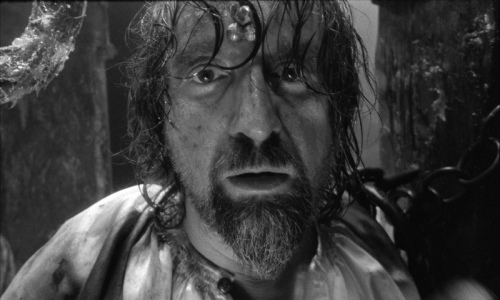by Allan Fish
(Russia 2013 177m) DVD1/2
Aka. Trudno byt bogom
Earth minus 800
p Viktor Izvekov, Leonid Yarmolnik d Aleksei German w Aleksei German, Svetlana Karmalita novel Arkadiy Strugatskiy, Boris Strugatskiy ph Yuriy Klimenko, Vladimir Ulin ed Irina Gorokhovskaya art Elena Zhukova, Georgi Kropachyov, Sergei Kokovkin
Leonid Yarmolnik (Don Rumata), Yevgeni Gerchakov (Budakh), Aleksandr Chutko (Don Reba), Valentin Golubenko (Arata), Yuri Tsurilo (Don Pampa), Oleg Botin (Bucher), Natalya Motova (Ari), Zura Kipzhidze (Zurab),
Remember that priceless moment in Monty Python and the Holy Grail, directly after the ‘Bring Out your Dead’ scene where Graham Chapman’s Arthur, King of the Britons, rides past accompanied by Terry Gilliam’s servant Patsy clumping coconut halves and John Cleese turns to cart driver Eric Idle and asked who that was, and Idle replies “must be a king. He hasn’t got shit all over him.” It’s hard not to think of Holy Grail when watching Aleksei German’s farewell statement. There’s no king here, everyone seems to have shit all over them, and proud they are, too. (more…)









![1983 Our Century.mp4_snapshot_00.06_[2015.05.08_10.05.34]](https://wondersinthedark.files.wordpress.com/2015/05/1983-our-century-mp4_snapshot_00-06_2015-05-08_10-05-34.jpg?w=500)





















 Click on names for archives
Writers/Founders
Click on names for archives
Writers/Founders